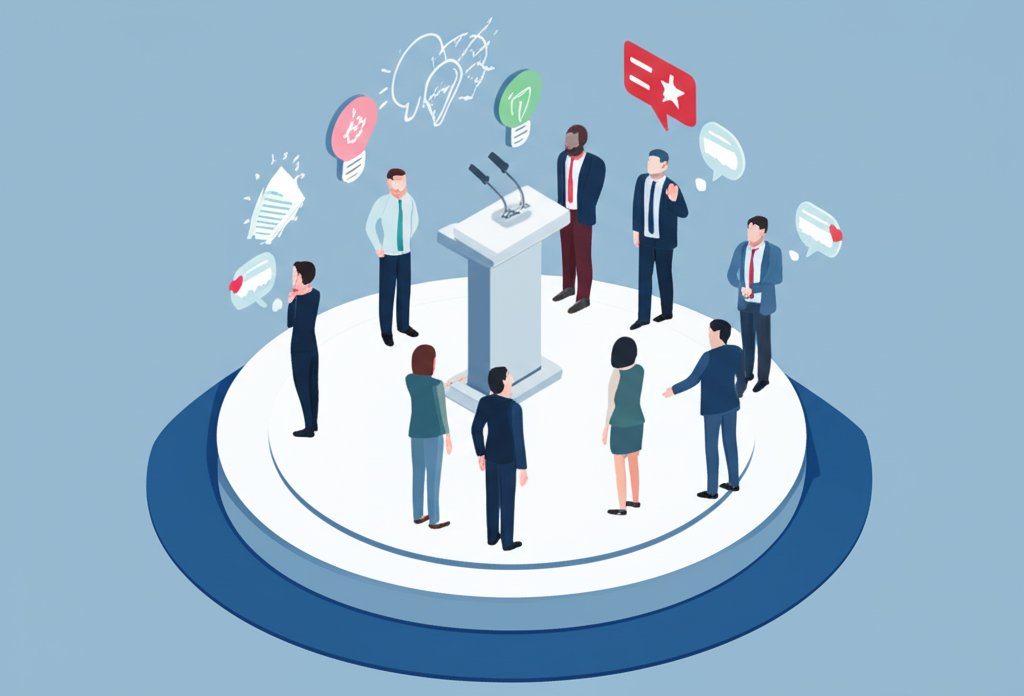In the intricate tapestry of human history, change is the only constant. Yet, this evolution is rarely smooth, often requiring courageous individuals to challenge the comfort of the familiar. It is at these pivotal junctures that political leaders step forward, choosing to ignite profound societal change by defying the status quo. These transformative leaders are not merely administrators of existing systems; they are architects of a new reality, envisioning and forging paths toward a more just, equitable, and progressive world. Their journey is fraught with challenges, demanding vision, resilience, and an unwavering commitment to their beliefs. This article delves into how these remarkable individuals reshape societies, exploring their motivations, strategies, and the enduring ripple effects of their leadership.
The Essence of Defying the Status Quo in Political Leadership
The status quo represents the existing state of affairs, the established norms, policies, and power structures within a society. For many, it offers stability and predictability. However, for transformative leaders, it often signifies stagnation, unaddressed injustices, or outdated systems that no longer serve the greater good.
What Does ‘Status Quo’ Truly Mean in Politics?
In the political arena, the status quo can manifest in various forms: entrenched economic inequalities, discriminatory laws, rigid social hierarchies, conventional diplomatic approaches, or even prevailing public opinion that resists progress. It’s the “way things have always been done.” Defying the status quo for political leaders means questioning these deeply rooted tenets, daring to suggest and implement alternative visions that often challenge powerful vested interests and ingrained public sentiment. It requires an acute awareness of systemic flaws and a resolute belief in the possibility of a better alternative.
Why Political Leaders Choose to Challenge the Norm
The motivation for political leaders to challenge the deeply embedded norms is multifaceted. Often, it stems from a profound sense of justice, a moral imperative to correct historical wrongs, or an innovative vision for future prosperity. They might be driven by:
- Moral Conviction: A deep-seated belief that certain aspects of society are fundamentally unjust or harmful.
- Visionary Outlook: The ability to see beyond current limitations and imagine a drastically improved future for their constituents.
- Empathetic Connection: A strong identification with the suffering or unmet needs of marginalized groups.
- Strategic Opportunity: Recognizing a window where systemic change is not only necessary but also achievable, despite significant opposition.
These leaders understand that true leadership sometimes means swimming against the tide, even when unpopular, to secure long-term gains for society.
The Inherent Risks and Rewards of Defying the Status Quo
Defying the status quo is inherently risky. Political leaders who embark on this path often face fierce resistance from those who benefit from the existing order, or those who simply fear change. Risks can include: political isolation, character assassination, loss of power, and even personal danger. The journey demands significant personal sacrifice.
However, the rewards can be monumental. Successful transformative leaders can:
- Eradicate systemic injustices.
- Foster economic growth and equitable distribution.
- Inspire generations with their courage and vision.
- Leave an indelible legacy of positive
societal change.
The ultimate reward is the fundamental reshaping of society into a more inclusive, just, and prosperous entity.
Traits and Strategies of Transformative Leaders
Transformative leaders possess a unique blend of personal attributes and strategic acumen that enables them to defy the status quo and achieve lasting societal change. Their influence extends beyond mere policy; it inspires fundamental shifts in perception and collective action.
Visionary Foresight and Articulate Communication
At the core of transformative leaders is an extraordinary ability to envision a future distinct from the present. This foresight is not mere dreaming; it’s a meticulously crafted vision of what society could be, backed by a deep understanding of the challenges and opportunities. Crucially, they are also masters of communication. They can articulate this vision with such clarity, passion, and conviction that it resonates deeply with the populace, converting skeptics and galvanizing supporters. Their rhetoric transcends policy details, tapping into shared values and aspirations, making the abstract idea of change feel tangible and achievable.
Building Coalitions and Mobilizing the Masses
No political leader sparks societal change in isolation. Transformative leaders excel at building broad coalitions, uniting disparate groups under a common banner. This involves:
- Strategic Alliances: Forging partnerships with like-minded individuals, organizations, and even former adversaries.
- Inspirational Messaging: Crafting narratives that transcend political divides and appeal to universal human values.
- Grassroots Engagement: Empowering ordinary citizens to become active participants in the movement for change, fostering a sense of collective ownership.
- Patience and Consistency: Recognizing that change is a marathon, not a sprint, and maintaining a steady, consistent message even in the face of setbacks.
Their leadership creates a synergistic force, transforming individual aspirations into a powerful collective movement.
Unwavering Resilience and Ethical Foundations
The path of defying the status quo is often met with immense resistance. Transformative leaders must possess unwavering determination and resilience to withstand criticism, setbacks, and personal attacks. They stand firm in their beliefs, even when facing adversity, drawing strength from their core convictions. This resilience is often underpinned by a strong ethical framework. Ethical leadership means:
- Leading by Example: Demonstrating integrity, honesty, and consistency between their words and actions.
- Moral Courage: Making difficult decisions based on principles, even when politically inconvenient.
- Accountability: Taking responsibility for actions and fostering a culture of transparency.
These ethical foundations build trust and admiration, which are crucial for maintaining support during prolonged struggles for societal change.
Empowering and Mentoring for Sustainable Societal Change
Transformative leaders don’t just lead; they empower. They understand that for societal change to be sustainable, it must outlast their individual leadership. This involves:
- Intellectual Stimulation: Encouraging critical thinking, challenging assumptions, and fostering environments where new ideas can flourish.
- Individualized Consideration: Mentoring emerging leaders, recognizing their potential, and investing in their growth and development.
- Delegation and Trust: Empowering followers with responsibility and agency, building their capacity to drive and sustain change independently.
By fostering a new generation of empowered citizens and leaders, they ensure their vision for a transformed society continues to evolve and thrive.
Catalysts for Societal Change: Case Studies of Iconic Political Leaders
History is replete with examples of political leaders whose courageous leadership in defying the status quo led to monumental societal change. Their stories serve as powerful testaments to the impact of transformative leadership.
Nelson Mandela: From Apartheid to Democracy
Nelson Mandela’s leadership in South Africa is a quintessential example of defying the status quo. Imprisoned for 27 years, his defiance of the apartheid regime—a system of brutal racial segregation—was unwavering. Upon his release, instead of seeking retribution, Mandela pursued reconciliation, leading the nation from racial division to a multi-racial democracy. His vision for a “rainbow nation” challenged centuries of racial animosity and ushered in an era of unprecedented societal change, proving that forgiveness and unity could dismantle even the most entrenched systems of oppression.
Mahatma Gandhi: Nonviolent Revolution and Independence
Mahatma Gandhi spearheaded India’s nonviolent independence movement against British colonial rule, effectively defying the status quo of imperial power through civil disobedience. His philosophy of Satyagraha, or truth-force, mobilized millions, demonstrating the immense power of nonviolent resistance as a political tool. Gandhi’s leadership not only secured India’s freedom but also inspired civil rights movements and transformative leaders worldwide, showcasing a radical alternative to armed conflict as a means of achieving societal change.
Martin Luther King Jr.: Championing Civil Rights
In the United States, Martin Luther King Jr. emerged as a pivotal political leader in defying the status quo of racial segregation and discrimination. His eloquent speeches, peaceful protests, and unwavering commitment to equality galvanized the Civil Rights Movement. King’s leadership directly challenged centuries of systemic racism, contributing to landmark legislation like the Civil Rights Act of 1964 and the Voting Rights Act of 1965. His vision continues to guide efforts toward a more just and inclusive society.
Pope Francis: Modernizing the Papacy and Global Advocacy
Since his ordination in 2013, Pope Francis has demonstrated remarkable leadership in defying the status quo within the oldest continuously functioning institution in the world – the Catholic Church. He has challenged long-standing norms by:
- Prioritizing the Marginalized: Consistently emphasizing care for the poor, refugees, and the vulnerable, shifting the Church’s focus outward.
- Environmental Advocacy: Issuing the encyclical “Laudato Si’,” which unequivocally links climate change to social justice, urging global action and challenging economic policies that harm the planet and its poorest inhabitants.
- Interfaith Dialogue: Actively engaging with leaders of other faiths, promoting understanding and peace, and
defying the status quoof historical religious rivalries. - Internal Reforms: Initiating reforms within the Vatican bureaucracy, addressing issues of transparency, financial accountability, and clergy abuse, often facing internal resistance.
Francis’s leadership exemplifies how a transformative leader can influence not only a vast religious institution but also global policy and societal change through moral authority and consistent messaging, proving that transformation is possible even in deeply traditional structures.
Navigating Resistance: Obstacles and Overcoming Them
The journey of defying the status quo is rarely smooth. Political leaders encounter formidable obstacles, ranging from entrenched political opposition to public skepticism. Successful transformative leaders employ a combination of strategic foresight, resilience, and effective communication to overcome these challenges.
Political Opposition and Entrenched Power Structures
The most immediate challenge political leaders face when defying the status quo is resistance from those who benefit from or are invested in the existing order. This can include:
- Political Rivals: Opposing parties or factions who view change as a threat to their power.
- Economic Elites: Groups whose wealth or influence is tied to the current system.
- Bureaucratic Inertia: Resistance from government institutions that are slow to adapt.
Overcoming this requires master negotiation skills, the ability to build cross-party consensus, and sometimes, the courage to outmaneuver powerful lobbies. Leaders must thoughtfully approach roadblocks and pitfalls, understanding that emotional reactions can be counterproductive.
Public Skepticism and Maintaining Momentum
Even with a clear vision, convincing the general public to embrace radical societal change can be difficult. People often gravitate towards the familiar, and fear of the unknown can breed skepticism or outright opposition. Transformative leaders must:
- Craft Compelling Narratives: Explain the necessity and benefits of change in a way that resonates with common citizens’ lives and values.
- Address Concerns Transparently: Acknowledge legitimate fears and provide clear plans for managing transitions.
- Maintain Momentum: Keep the issue at the forefront of public discourse, celebrating small victories, and demonstrating progress to sustain hope and engagement.
- Be Patient: Understand that
societal changetakes time and consistent effort.
The Role of Patience and Consistency in Long-Term Leadership
Defying the status quo is typically a long-term endeavor. Transformative leaders understand that profound societal change does not happen overnight. They exhibit immense patience, persisting through temporary setbacks and prolonged struggles. This patience is coupled with consistency in messaging and action. By repeatedly articulating their vision and demonstrating unwavering commitment, they gradually erode resistance, build trust, and solidify public support. Their consistent leadership acts as a steady hand, guiding society through turbulent periods of transformation.
The Lasting Impact of Defying the Status Quo on Society

The efforts of political leaders who successfully defy the status quo echo through generations, leaving an indelible mark on the fabric of society. Their leadership fundamentally redefines societal norms and possibilities.
Redefining Justice and Equality
Perhaps the most profound impact of transformative leaders is their ability to redefine and expand notions of justice and equality. By challenging discriminatory practices and advocating for marginalized groups, they push society to live up to its highest ideals. This includes:
- Ending Apartheid: As seen with Mandela, fundamentally altering the legal and social definition of citizenship.
- Securing Civil Rights: King’s legacy ensured that equality before the law became a foundational principle, despite ongoing challenges.
- Promoting Human Rights: Leaders often champion the rights of all individuals, irrespective of their background, challenging historical prejudices.
These changes are not merely legal; they foster a deeper moral awareness within the collective consciousness, leading to more inclusive and compassionate societies.
Fostering Innovation and Progress
Defying the status quo creates an environment ripe for innovation. When old ways are challenged, new solutions emerge. Political leaders who encourage this mindset can accelerate progress across various sectors:
- Economic Innovation: Encouraging new industries, technologies, or economic models that benefit a broader segment of the population.
- Social Innovation: Developing new approaches to social welfare, education, healthcare, and urban planning.
- Democratic Evolution: Reforming political systems to be more representative, transparent, and accountable.
By breaking free from convention, these leaders unlock untapped potential and pave the way for a more dynamic and adaptable society.
Inspiring Future Generations of Political Leaders
The most enduring legacy of transformative leaders is their capacity to inspire. Their courage, vision, and dedication serve as powerful role models for future generations. Stories of political leaders who defy the status quo:
- Empower Citizens: Showing that individuals and collective action can indeed bring about profound change.
- Cultivate New Leaders: Motivating young people to enter public service and to pursue ambitious visions for their communities and nations.
- Maintain Vigilance: Reminding society that progress is an ongoing process, requiring continuous engagement and willingness to challenge new forms of
status quothat may emerge.
Their actions become part of the historical narrative, shaping collective memory and offering a blueprint for future leadership in driving societal change.
Conclusion
The journey of political leaders who defy the status quo is one of immense courage, profound vision, and arduous effort. These transformative leaders are the driving force behind societal change, daring to challenge the established order and envision a better future. From advocating for human rights and dismantling oppressive systems to mobilizing global awareness around critical issues like climate change, their impact is undeniable and everlasting. Their leadership reminds us that progress is not inevitable; it is forged through the dedication of individuals who are willing to stand apart, speak truth to power, and inspire millions to join them in the pursuit of a more just and equitable world. As citizens, recognizing and supporting such leadership is paramount, for it is through this collaborative spirit that societies truly transform.
FAQ

Q1: How do political leaders identify the status quo needing change?
Political leaders often identify aspects of the status quo needing change through a combination of empathetic observation, deep analytical understanding, and feedback from constituents. They critically examine existing policies, laws, and social norms, looking for areas of inequality, inefficiency, or injustice that negatively impact a significant portion of society. Their visionary leadership allows them to see potential solutions where others only see entrenched problems.
Q2: What is the primary difference between a traditional leader and a transformative leader?
A traditional leader often operates within existing frameworks, aiming to maintain stability and incremental progress. In contrast, a transformative leader fundamentally challenges the status quo, seeking radical societal change by redefining norms, inspiring new visions, and empowering followers to achieve extraordinary outcomes. Their leadership is less about managing the present and more about actively creating a new future.
Q3: Can defying the status quo ever be detrimental to societal change?
Yes, defying the status quo can be detrimental if it lacks clear vision, ethical grounding, or broad support, potentially leading to chaos, instability, or unintended negative consequences. Transformative leaders must distinguish between constructive challenging and reckless disruption. Successful defying the status quo requires thoughtful planning, consistent communication, and a careful balance of passion with pragmatism.
Q4: What role does public support play in leaders defying the status quo?
Public support is absolutely critical for political leaders defying the status quo. Without it, even the most visionary transformative leaders will struggle to overcome entrenched opposition. Public mobilization provides legitimacy, pressure on opponents, and the collective energy needed to sustain long campaigns for societal change. Leaders must effectively communicate their vision and build broad coalitions to gain and maintain this support.
Q5: How can individuals contribute to societal change inspired by transformative leaders?
Individuals can contribute to societal change by actively participating in democratic processes, advocating for causes they believe in, supporting transformative leaders through their actions and voices, and challenging small-scale injustices in their own communities. Learning from the traits of transformative leaders (like vision, resilience, and ethical conduct) can also inspire personal leadership in driving change from the grassroots up.
Q6: Are there common patterns in the strategies used by political leaders who successfully defy the status quo?
Yes, common patterns include:
leadership: Maintaining integrity and trust.leadership. These strategies enable political leaders to navigate resistance and achieve lasting societal change by defying the status quo.









